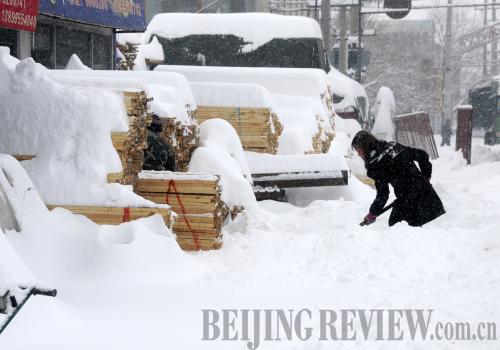|
 |
|
BLANKETED CITY: A woman clears a snow-covered road in Kuitun City, northwest China's Xinjiang Uygur Autonomous Region, on February 23. Some regions in northern Xinjiang had more than 55 cm of snow after being hit by a storm that lasted over 10 hours (LONG HAIBO) |
Party Ethics
The Communist Party of China (CPC) Central Committee issued a code of ethics on February 23 for CPC cadres to follow to ensure clean practices in their work and prevent corruption.
The guidelines specify 52 unacceptable practices with respect to CPC leaders and cadres of various levels, including accepting cash or financial instruments as gifts and using their influence to benefit their spouses, children or "special concerned persons" with regards to their employment, stock trading or business.
People's Concerns
Online polls show "livelihood issues" are Chinese people's top concerns ahead of the country's annual parliamentary and political advisory sessions.
Chinese netizens have voiced their complaints online and hope their voices will be heard by top leaders, national lawmakers and political advisors, who will soon gather in Beijing for the two sessions in March.
Pensions, housing and health care are among the top concerns, according to polls conducted by People's Daily, Xinhua News Agency and the national broadcaster China Central Television.
"Pensions" earned 25,508 votes at people.com.cn, followed by anti-corruption, housing prices, the income gap, employment and health care, among others. "Pensions" also ranked among the top five concerns at cctv.com.
Scalpers Crackdown
Chinese railway police arrested 446 people for scalping train tickets during the Spring Festival, also known as the Chinese Lunar New Year, holiday rush, the Ministry of Public Security said on February 22.
During the seven-day holiday that ended February 19, railway police raided 47 ticket scalping dens, the ministry said on its website.
Police arrested about 6,000 people for scalping train tickets and confiscated more than 27,000 tickets ahead of the Spring Festival since the ministry launched the crackdown on January 21.
More than 29.6 million passengers traveled by train during the holiday from February 13 to 19, up 11.9 percent from a year earlier, according to the Ministry of Railways.
Accelerated Urbanization
China's rural population will shrink from the current 900 million to 400 million in 30 years, a top Chinese rural economist estimated.
Han Jun, Director of the Research Department of Rural Economy with the State Council's Development Research Center, a top think tank, said on February 24 farmers will continue to seek jobs in cities despite the recent labor shortages in China's coastal export hubs.
"This figure is drawn from our recent studies, based on the current rate of urbanization, as well as the hosting capacity of cities," he said.
As the world's most populous country, China boasts a population of 1.3 billion. UN estimated in 2003 China's population will peak in 2030 at 1.45 billion.
Guarding State Secrets
The Standing Committee of the 11th National People's Congress deliberated over a draft amendment to the State Secrets Law for the second time during the standing committee's bimonthly session that started on February 24.
Compared with the existing law on guarding state secrets, which took effect in May 1989, the new draft defines secrecy levels and authority limits and clarifies time limits for different levels of confidentiality and conditions for declassification.
The time limit for maintaining top-level secrets should be no more than 30 years, no more than 20 years for low-level state secrets, and less than 10 years for ordinary state secrets, the draft states. | 